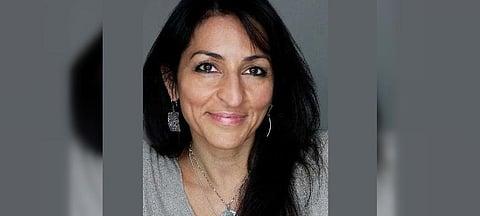Susan Abulhawa: Daring to lift the veil
Palestinian American writer and political activist Susan Abulhawa was born to refugees of the Six Day War of 1967. Born in Kuwait, she moved to the US as a teenager and currently lives with her daughter in Pennsylvania. Her debut novel, Mornings in Jenin - which came out in 2010 - was an international bestseller. It was translated into 30 languages.
Likewise, her second book in 2015—The Blue Between Sky and Water—was a bestseller and translated into 20 languages. She spoke to us, among other things, about her latest novel Against the Loveless World. It is the story of Nahr—from her beginnings in Kuwait as the daughter of Palestinian refugees to her transformative love affair with her homeland, Palestine—and a man dedicated to its liberation.
Is your protagonist, Nahr, inspired by someone in real life?
Nahr began as an indistinct outline of a character. But over the course of writing, I fell in love with her and let her write her own story. I don’t like calling her a character anymore, because she feels very real to me. She is the product of imagination that roams reality. In her case, the reality was that of refugees, sex workers, patriarchy, war, imperialism, colonialism and finally, love and armed resistance. Ultimately, Nahr is a composite of real and imagined women.
Would you like to share with us some of your earliest memories?
My first memories were in Charlotte, North Carolina, where we lived in a poor neighbourhood. I went back to Kuwait around the age of five and started school there, not speaking Arabic. So, while English is the first language I learned to speak, Arabic is the first language I learned to read and write. Some of my early memories are trying to sort out what was being said around me.
From Kuwait, I spent three years in an orphanage in Jerusalem. My memories of those formidable years in three distinct places vary, but they are bound by the common theme of dislocated people trying to find continuity in our indigenous traditions—food, large gatherings of family and friends, storytelling—and sorting through the trauma of never really getting a foothold anywhere else in the world.
In 2001, you founded Playgrounds for Palestine, an NGO that advocates for Palestinian children by building playgrounds in refugee camps in Lebanon. Could you share with us some interesting incidents that you encountered while working for it?
This project has been a labour of love from its inception. We’ve built numerous playgrounds and sponsored many children’s programmes, including skateboarding summer camps, kindergartens, theatre, circus acrobatics and more.
One project that has stood out was a playground we installed in Khan Younis in Gaza around 2004. The children were so excited about it and anxious for us to finish. They would come early in the morning to watch us build and then run back to the site after school to see how much we had gotten done by the afternoon.
Who are some of your literary inspirations and favourite authors?
There are quite a few. Some of my favourites include One Hundred Years of Solitude by Gabriel Garcia Marquez; Time of the White Horses by Ibrahim Nasrallah; The God of Small Things by Arundhati Roy; The Color Purple by Alice Walker; Men in The Sun by Ghassan Kanafani; Before the Queen Sleeps by Huzama Habayeb; and There There by Tommy Orange.
Do writers like yourself still face repression or government backlash for expressing your ideas?
Yes, we do face censorship. For example, in my most recent book, I had to remove a line by one of the characters who made a disparaging remark related to the events of 9/11 in the US. I was told that keeping the fictional character’s honest antipathy toward Americans following their total destruction of Iraq would greatly diminish the book’s chances of being sold in the US. So, I had to make a choice between loyalty to that character and loyalty to Nahr, the protagonist.
I chose the latter, but that choice stands as an example of the ways in which Palestinians (and Arabs in general) are censored in the US. Also, we are often ignored by mainstream media if our work challenges popular notions of Israeli benevolence.
This has been the case with both my previous novels, despite the international success of my first novel. Government censorship is another matter, and occurs sometimes in the Arab world. For example, the Arabic translation of Mornings in Jenin—but not the English original—is banned in Jordan for a single line that criticises a historic instance of duplicity by the King of Jordan in 1948.

